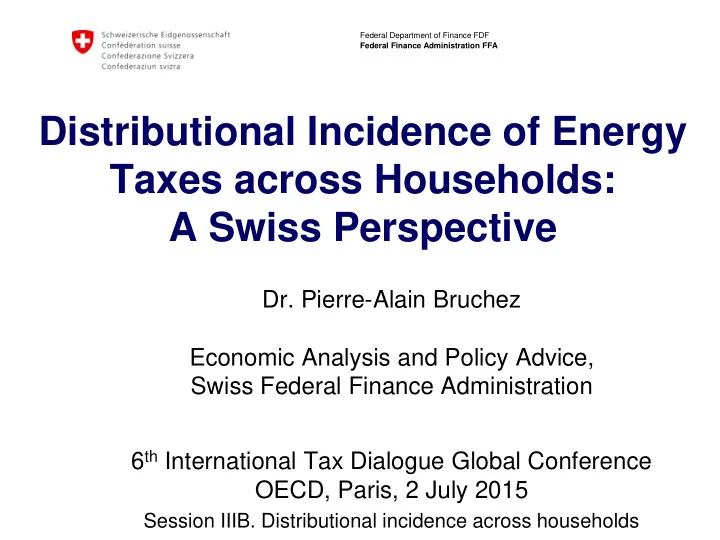

Federal Department of Finance FDF Federal Finance Administration FFA Distributional Incidence of Energy Taxes across Households: A Swiss Perspective Dr. Pierre-Alain Bruchez Economic Analysis and Policy Advice, Swiss Federal Finance Administration 6 th International Tax Dialogue Global Conference OECD, Paris, 2 July 2015 Session IIIB. Distributional incidence across households
1. The Swiss context Challenge • Phasing out nuclear energy • While reducing CO2 emissions Proposals to increase the role of energy taxes • Popular initiative of the green liberals to replace the value- added tax by a tax on non-renewable energy Distributional issues played a role in its massive rejection by the people in March 2015 • Proposal of the government The government will send its proposal to the Parliament in November 2015 Federal Department of Finance FDF 6 th International Tax Dialogue Global Conference / P.-A. Bruchez / 2.7.2015 2 Federal Finance Administration FFA
2. The government’s proposal • A constitutional amendment A constitutional amendment giving the possibility to introduce an incentive tax • Goals Incentive taxes should be set such as to make an essential contribution to the objectives of energy and climate policy • Tax base Heating fuel, motor fuel, electricity • Exemptions Firms for which the incentive taxes would lead to unreasonable charges should be taken into account • Revenue use The money will be given back to the population and the economy • Phasing out of current subsidies Current subsidies for energy conservation in buildings and green electricity will be phased out Federal Department of Finance FDF 6 th International Tax Dialogue Global Conference / P.-A. Bruchez / 2.7.2015 3 Federal Finance Administration FFA
3. Possible implementation Examples Combination 1 Combination 2 Combination 3 Combination 4 Purely for illustration 2021 2030 2021 2030 2021 2030 2021 2030 + ct/kWh 2.3 4.5 2.3 4.5 2.3 4.5 2.3 4.5 Electricity Tax revenue year 2030 2.19 2.13 2.12 2.05 Billion CHF Objective 100% 100% 100% 100% achieved Heating fuel 25 44 32 63 32 63 32 89 + ct/l Gasoline Climate CO2 0 0 0 0 1.3 13 2.6 26 + ct/l Tax revenue year 2030 1.67 2.19 2.86 4.03 Billion CHF Objective 18% 28% 46% 71% achieved Very weak Impact of the tax Weak incentive Moderate incentive Strong incentive incentive Still to be done A great deal A lot Moderate Little Source: adapted from Ecoplan 2015 Federal Department of Finance FDF 6 th International Tax Dialogue Global Conference / P.-A. Bruchez / 2.7.2015 4 Federal Finance Administration FFA
4. The government’s proposal will not be regressive A pure incentive tax • The money will be given back to the population and the economy Regressive or progressive? • The energy tax itself is regressive • Overall, the reform will be regressive or progressive depending on how the money is given back • Giving back lump sum will make the reform progressive Federal Department of Finance FDF 6 th International Tax Dialogue Global Conference / P.-A. Bruchez / 2.7.2015 5 Federal Finance Administration FFA
Progressive if redistributed lump sum Change in welfare (environmental impact not included) Households without kids Households with kids Retired (left to right: lower to (left to right: lower to (left to right: lower to higher income quintile) higher income quintile) higher income quintile) Source: Ecoplan: « Auswirkungen einer ö kologischen Steuerreform » , Berne, 2012, pages 90ff, Figure adapted by FFA http://www.efv.admin.ch/d/downloads/finanzpolitik_grundlagen/els/Gutachten_ECOPLAN_d.pdf Federal Department of Finance FDF 6 th International Tax Dialogue Global Conference / P.-A. Bruchez / 2.7.2015 6 Federal Finance Administration FFA
Regressive if redistributed by reducing income tax Change in welfare (environmental impact not included) Households without kids Households with kids Retired (left to right: lower to (left to right: lower to (left to right: lower to higher income quintile) higher income quintile) higher income quintile) Source: Ecoplan: « Auswirkungen einer ö kologischen Steuerreform » , Berne, 2012, pages 90ff, Figure adapted by FFA http://www.efv.admin.ch/d/downloads/finanzpolitik_grundlagen/els/Gutachten_ECOPLAN_d.pdf Federal Department of Finance FDF 6 th International Tax Dialogue Global Conference / P.-A. Bruchez / 2.7.2015 7 Federal Finance Administration FFA
5. The Trade-off distribution / growth • Trade-off between - avoiding negative distributional impact (by redistributing lump sum) - compensating for negative impact on growth (redistribution through other tax reductions) • Consultations show little support for redistributing through tax reductions Lump sum distribution to households (for administrative reasons redistribution through reduction of compulsory private health care premium) • But distributional issue between urban and rural areas Federal Department of Finance FDF 6 th International Tax Dialogue Global Conference / P.-A. Bruchez / 2.7.2015 8 Federal Finance Administration FFA
6. Distribution urban / rural areas Tax - redistribution relative to Swiss mean (for combination 4, heating fuel and motor fuel only ) Ecoplan: « Auswirkungen eines Klima- und Energielenkungssystem für 2030 » , Berne, 2015, pages 68 Source: http://www.efv.admin.ch/d/downloads/finanzpolitik_grundlagen/els/OESR6_sb_2015_01_13d.pdf?lang=de&msg-id=50122 Federal Department of Finance FDF 6 th International Tax Dialogue Global Conference / P.-A. Bruchez / 2.7.2015 9 Federal Finance Administration FFA
7. Conclusion • Crucial for acceptance Solving distributional issues is crucial for acceptance of a reform. • Solution for Switzerland: Lump sum redistribution - In the case of the Swiss government‘s project, distributional issues „low income versus high income households“ will likely be solved with lump sum redistribution. - Other instruments for reaching environmental goals also have a distributional impact, but it cannot be reversed by redistributing the money. • But ... Another distributional issue may come to the forefront: urban versus rural areas. • Work in progress The future will tell how the issue will finally be managed: government‘s proposal, Parliament, decision of the people (referendum). Federal Department of Finance FDF 6 th International Tax Dialogue Global Conference / P.-A. Bruchez / 2.7.2015 10 Federal Finance Administration FFA
Recommend
More recommend